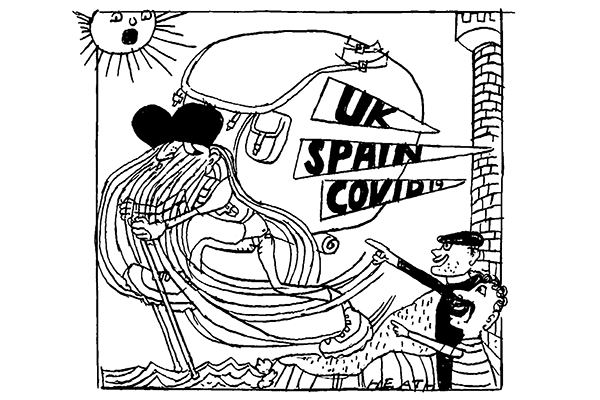A few of the hip young things sitting along the Lisbon quayside turned their heads my way as my walking sticks scraped along the pavement. I didn’t slow down, though, because I was self-conscious about how I looked. Hiking 1,200 miles along an extended Camino pilgrimage from the French-Spanish border through northern Spain then down through Portugal will do that to you. My beard had gone feral, my graying hair was out of control. The gaze of my eyes was increasingly unhinged; one friend cautioned similarities to King Lear. Nevertheless, I tried to hold my head high. Little do you know (I silently said to the quayside beauty pageant), but this apparent vagrant used to be an officer in one of Her Majesty’s finest cavalry regiments.
Just as I never expected to end up in a 70-ton main battle tank with the Queen’s commission, I didn’t foresee escaping the UK’s revolving lockdowns by existing as an itinerant praying mantis on the Iberian Peninsula. But perhaps it shouldn’t have come as such a surprise. Portugal is our oldest ally, the friendship going back to 1147, when English crusaders helped King Alfonso I to capture Lisbon from the invading Muslims. The Anglo-Portuguese alliance came to the fore during the Napoleonic Wars, as the actor Sean Bean aptly demonstrated when he played the fictional soldier Richard Sharpe in the 1990s television series Sharpe, based on Bernard Cornwell’s novels.
Following in Sharpie’s stead was an intense, exhilarating but also humbling experience. My motivations for going on a pilgrimage spanned the religious — I’m a cradle Catholic further indoctrinated by Benedictine monks while at school — to the desperate. I wanted to escape COVID-19 lockdowns, because my life’s trajectory had already taken a nosedive in 2019 and the pandemic was making matters worse. It was wonderful to taste freedom again. My pilgrimage gave me a sense of agency rather than emasculation. But the lifestyle of a Camino pilgrim isn’t dissimilar to that of a destitute vagrant. I moved constantly between cheap hostels and lived out of plastic shopping bags. You reach a point where you don’t care about getting pee on yourself during the day’s 15-mile hike.
In Lisbon, I found myself surrounded by grand architecture and Tesla cars. The city’s unique, enchanting light — the white and lioz limestone in the buildings reflecting, scattering and intensifying the glow — made me feel even more at one with George Orwell’s experience in Down and Out in Paris and London. I remember reading the book as a young army officer when I was earning about three times what dribbles in now as a freelance journalist, and thinking: oof, poor George, wouldn’t want to go through that.
At least my experience of all this was temporary. Not so for many in Lisbon and around Portugal. Out of a population of just over 10 million, it is estimated that around 2.6 million live below the poverty line. Child labor is common in Portugal’s northern and central parts. On my way to a Lisbon bar one evening to meet some pilgrim friends (before the new restrictions began), I passed a long line of darkened figures lining for a soup kitchen. In Porto on Christmas Day, I helped prepare free meals at a Catholic church for an assortment of locals. They ranged from the perennially homeless to those struggling with rent because of the economic impact of the pandemic. At the end, one of the church coordinators asked, with sympathetic eyes, if I too wanted to take away some food; I settled for a glass of port.
In Vigo, I arrived at a hostel along with another pilgrim I had been traveling with. We found it closed due to COVID-19. We turned from the door to see a well-dressed woman, probably in her late fifties, approaching us in the street. I assumed she would advise us on where else to find accommodation. Instead, she stuck out an upturned palm. My companion gave her a 10 euro note.
There were lots of other outstretched Portuguese hands and plaintive eyes in cities, towns and villages along the way. I was also offered lots of drugs. Might these have been ominous hints, I wonder, of the human toll of the pandemic’s economic restrictions coming to the UK and wealthier European countries? After the eurozone crisis and the 2008 financial crisis, the acronym PIIGS did the rounds. It denoted the countries — Portugal, Ireland, Italy, Greece and Spain — worst hit by the economic slump. The irony is that increasing numbers of foreigners, especially Brits, are moving to Portugal. It was happening before the pandemic and I can’t see why the rate shouldn’t accelerate. Outside a Portuguese pub which catered to expats with pints of Guinness, I got talking to a 38-year-old Londoner who emigrated seven months ago. ‘Absolutely loving it,’ he said of his relocation, explaining that the grimness of locked-down London life sealed it for him. ‘The great weather, the friendly people, the slower pace — I’ve even become a surfing addict. Best decision we ever made.’ He had options thanks to both his and his partner’s well-paid jobs which could be done remotely. Others in the UK aren’t so fortunate. We may soon have a better understanding of what it’s like to be one of the PIIGS as more Brits fall through the pandemic-created gaps.
This article was originally published in The Spectator’s UK magazine. Subscribe to the US edition here.

























